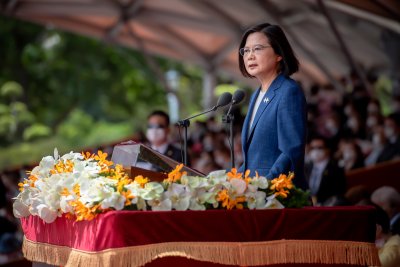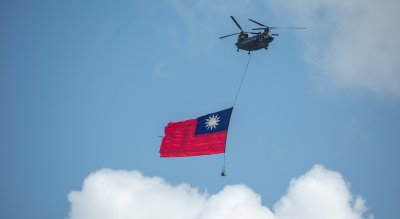Taiwan President Tsai Ing-wen rebuffed Chinese leader Xi Jinping in her most defiant speech yet on Sunday after the latter gave a competing address in which he extolled the Communist Party and its plans for the island's future.
In 5,000-word remarks for the 110th anniversary of the Republic of China (ROC)—Taiwan's formal name—Tsai called on her citizens to be "masters of our own destiny," in a speech her spokesperson described as a heartfelt message from a president who is no longer running for reelection.
Her address came 24 hours after China's Xi spoke at length to mark the Xinhai Revolution of 1911, the event—originating in the central Chinese city of Wuhan—that led to the overthrow of the Qing dynasty and the establishment of the ROC. Xi referenced "a republic on Chinese soil" but didn't name the ROC, which the People's Republic of China (PRC) considers to be over, despite its de facto existence in Taiwan.
In words that were meant to be heeded by Taiwan's government as well as its people, Xi linked his Taiwan ambitions to the "rejuvenation" of the Chinese nation, calling "unification" of the island "the general trend of Chinese history" and "the common will of all Chinese people." He also reiterated China's intention to rule Taiwan under a Hong Kong–style "one country, two systems" formula.
He struck an overall softer tone by emphasizing unification by peaceful means, saying it serves both China and Taiwan. Beijing's officials, however, continue to remind their counterparts in Taipei that China will never renounce the use of force to achieve their goal.
Xi also concluded with a stark warning about loyalty to China, saying: "Those who forget their heritage, betray their motherland, and seek to split the country will come to no good end; they will be disdained by the people and condemned by history."



In Tsai's prepared remarks the next day—described by commentators as the strongest of her presidency so far—she didn't shy away from speaking out against China's military intimidation and political isolation of Taiwan.
"But the more we achieve, the greater the pressure we face from China," Tsai said, following her praise for Taiwan's part in global health contributions and its shoring up of the global semiconductor supply chain. "So I want to remind all my fellow citizens that we do not have the privilege of letting down our guard."
"We call for maintaining the status quo, and we will do our utmost to prevent the status quo from being unilaterally altered," she said, before repeating her desire for meaningful dialogue with Beijing "on the basis of parity."
She added: "We hope for an easing of cross-strait relations and will not act rashly, but there should be absolutely no illusions that the Taiwanese people will bow to pressure. We will continue to bolster our national defense and demonstrate our determination to defend ourselves in order to ensure that nobody can force Taiwan to take the path China has laid out for us."
China's plan for Taiwan "offers neither a free and democratic way of life for Taiwan, nor sovereignty for our 23 million people," she argued.
Tsai committed to four positions that she called "the bottom line and common denominator" most widely accepted by the people of Taiwan. Among them were the insistence that the ROC and PRC "should not be subordinate to each other" as well as Taiwan's commitment to "resist annexation or encroachment upon our sovereignty."
The future of Taiwan, Tsai said, "must be decided in accordance with the will of the Taiwanese people"—a direct rejection of Xi's view that Taiwan's future as a province of China is the "will of all Chinese people."
Tsai concluded her remarks with a pledge to push constitutional amendments and institutional reforms that will preserve Taiwan's democratic system.
Uncommon Knowledge
Newsweek is committed to challenging conventional wisdom and finding connections in the search for common ground.
Newsweek is committed to challenging conventional wisdom and finding connections in the search for common ground.
About the writer
John Feng is Newsweek's contributing editor for Asia based in Taichung, Taiwan. His focus is on East Asian politics. He ... Read more
To read how Newsweek uses AI as a newsroom tool, Click here.








